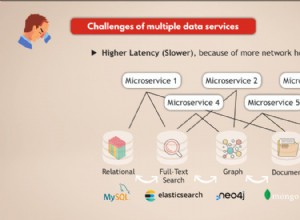TLDR; Mongoose-Middleware wurde dafür nicht entwickelt.
Diese Methode zum Einfügen von Transaktionen patcht tatsächlich die Middleware-Funktionalität, und Sie erstellen im Wesentlichen eine API, die vollständig vom mongoose getrennt ist Middleware.
Besser wäre es, die Logik für Ihre Entfernungsabfrage in einer separaten Funktion umzukehren.
Einfache und beabsichtigte Lösung
Lassen Sie eine Transaktionsbehandlungsmethode ihre Wirkung entfalten und erstellen Sie eine separate Entfernungsmethode für Ihr übergeordnetes Modell. Mongoose umschließt mongodb.ClientSession.prototype.withTransaction mit mongoose.Connection.prototype.transaction und wir müssen nicht einmal eine Sitzung instanziieren oder verwalten! Sehen Sie sich den Unterschied zwischen der Länge von diesem und jenem unten an. Und Sie sparen sich die mentalen Kopfschmerzen, sich die Interna dieser Middleware auf Kosten einer separaten Funktion zu merken.
const parentSchema = new mongoose.Schema({
name: String,
children: [{ type: mongoose.Schema.Types.ObjectId, ref: "Child" }],
});
const childSchema = new mongoose.Schema({
name: String,
parent: { type: mongoose.Schema.Types.ObjectId, ref: "Parent" },
});
// Assume `parent` is a parent document here
async function fullRemoveParent(parent) {
// The document's connection
const db = parent.db;
// This handles everything with the transaction for us, including retries
// session, commits, aborts, etc.
await db.transaction(async function (session) {
// Make sure to associate all actions with the session
await parent.remove({ session });
await db
.model("Child")
.deleteMany({ _id: { $in: parent.children } })
.session(session);
});
// And done!
}
Kleine Erweiterung
Eine andere Möglichkeit, dies zu vereinfachen, besteht darin, eine Middleware zu registrieren, die einfach eine Sitzung iff erbt _ die Abfrage hat eine registriert. Eventuell einen Fehler auslösen, wenn eine Transaktion nicht gestartet wurde.
const parentSchema = new mongoose.Schema({
name: String,
children: [{ type: mongoose.Schema.Types.ObjectId, ref: "Child" }],
});
const childSchema = new mongoose.Schema({
name: String,
parent: { type: mongoose.Schema.Types.ObjectId, ref: "Parent" },
});
parentSchema.pre("remove", async function () {
// Look how easy!! Just make sure to pass a transactional
// session to the removal
await this.db
.model("Child")
.deleteMany({ _id: { $in: parent.children } })
.session(this.$session());
// // If you want to: throw an error/warning if you forgot to add a session
// // and transaction
// if(!this.$session() || !this.$session().inTransaction()) {
// throw new Error("HEY YOU FORGOT A TRANSACTION.");
// }
});
// Assume `parent` is a parent document here
async function fullRemoveParent(parent) {
db.transaction(async function(session) {
await parent.remove({ session });
});
}
Riskante und komplexe Lösung
Das funktioniert und ist total schrecklich komplex. Nicht empfohlen. Wird wahrscheinlich eines Tages kaputt gehen, weil es auf Feinheiten der Mungo-API angewiesen ist. Ich weiß nicht, warum ich das codiert habe, bitte fügen Sie es nicht in Ihre Projekte ein .
import mongoose from "mongoose";
import mongodb from "mongodb";
const parentSchema = new mongoose.Schema({
name: String,
children: [{ type: mongoose.Schema.Types.ObjectId, ref: "Child" }],
});
const childSchema = new mongoose.Schema({
name: String,
parent: { type: mongoose.Schema.Types.ObjectId, ref: "Parent" },
});
// Choose a transaction timeout
const TRANSACTION_TIMEOUT = 120000; // milliseconds
// No need for next() callback if using an async function.
parentSchema.pre("remove", async function () {
// `this` refers to the document, not the query
let session = this.$session();
// Check if this op is already part of a session, and start one if not.
if (!session) {
// `this.db` refers to the documents's connection.
session = await this.db.startSession();
// Set the document's associated session.
this.$session(session);
// Note if you created the session, so post can clean it up.
this.$locals.localSession = true;
//
}
// Check if already in transaction.
if (!session.inTransaction()) {
await session.startTransaction();
// Note if you created transaction.
this.$locals.localTransaction = true;
// If you want a timeout
this.$locals.startTime = new Date();
}
// Let's assume that we need to remove all parent references in the
// children. (just add session-associated ops to extend this)
await this.db
.model("Child") // Child model of this connection
.updateMany(
{ _id: { $in: this.children } },
{ $unset: { parent: true } }
)
.session(session);
});
parentSchema.post("remove", async function (parent) {
if (this.$locals.localTransaction) {
// Here, there may be an error when we commit, so we need to check if it
// is a 'retryable' error, then retry if so.
try {
await this.$session().commitTransaction();
} catch (err) {
if (
err instanceof mongodb.MongoError &&
err.hasErrorLabel("TransientTransactionError") &&
new Date() - this.$locals.startTime < TRANSACTION_TIMEOUT
) {
await parent.remove({ session: this.$session() });
} else {
throw err;
}
}
}
if (this.$locals.localSession) {
await this.$session().endSession();
this.$session(null);
}
});
// Specific error handling middleware if its really time to abort (clean up
// the injections)
parentSchema.post("remove", async function (err, doc, next) {
if (this.$locals.localTransaction) {
await this.$session().abortTransaction();
}
if (this.$locals.localSession) {
await this.$session().endSession();
this.$session(null);
}
next(err);
});




